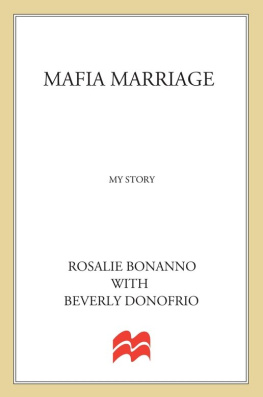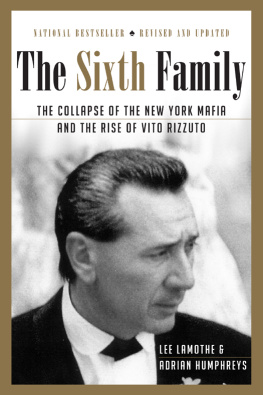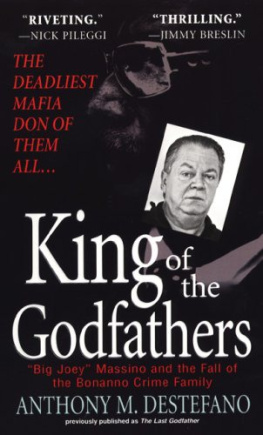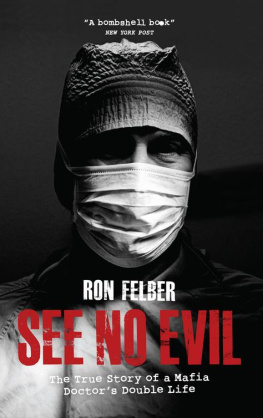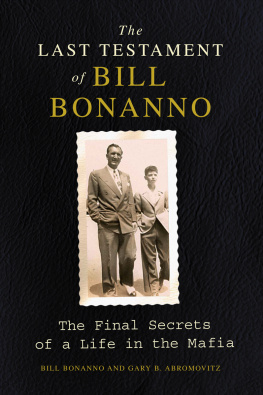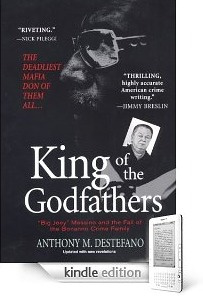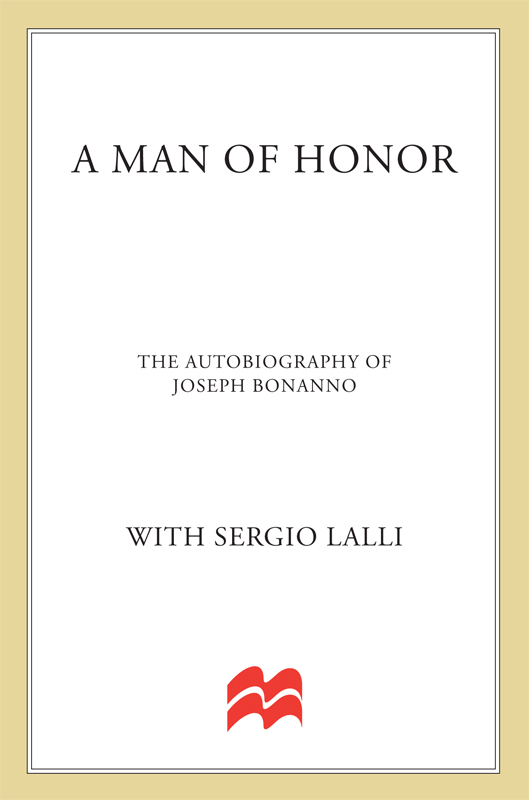
The author and publisher have provided this e-book to you for your personal use only. You may not make this e-book publicly available in any way. Copyright infringement is against the law. If you believe the copy of this e-book you are reading infringes on the authors copyright, please notify the publisher at: us.macmillanusa.com/piracy.
CONTENTS
GET THE FACTS, MAKE YOUR DECISION, PREPARE DILIGENTLY, IMPLEMENT WITH FINALITY
Maranzano performed the loading of the shotgun shells as if it were a sacred ritual, with great precision, even elegance.
I said nothing. Sitting on the bed, watching him fill the cartridges, I became entranced with Maranzano, who concentrated totally on what he was doing. Then, without looking up at me, he began a hushed monologue.
To kill a rabbit, to kill a deer, to kill even a bear is simple. You aim steady and you shoot. But man is the hardest animal to kill. When you aim at a man, your hands shake, your eyes twitch, your heart flutters, your mind interferes. Man is the hardest animal to kill. If possible you should always touch the body with your gun to make sure the man is dead. Man is the hardest animal to kill. If he gets away, he will come back to kill you.
ACKNOWLEDGMENTS
T HIS BOOK would not have been possible without the energy of many people who helped transform an idea into a finished product. Their encouragement, assistance and criticism has helped me in one way or another, some without recognizing the importance of their comments.
I want to thank the people at Simon and Schuster: Michael Korda, editor-in-chief, for recognizing the true me in the book; John Herman, my editor, for his suggestions and refining the manuscript, and Vincent Virga for a brilliant photo section. Additional thanks go to Frank Metz for developing the jacket; Eve Metz for turning a set of manuscripts into a beautifully designed book; Elaine Marion for her sensitive understanding; and Julia Knickerbocker for her enthusiastic support. The constant enthusiasm of my literary agent, Frank Cooper, encouraged me at times when he was the sole reader.
Another early reader, whose counsel I greatly appreciated, was my lawyer, Alfred (Skip) Donau III.
Credit for manuscript typing (and for catching most of the spelling errors) deservedly goes to Diana Ossana.
At one stage or another, the book became a true family project. I wish to thank my son Joseph, my daughter, Catherine, and my son Salvatore for their loving efforts in this project, especially Salvatore (Bill). To my daughters-in-law, son-in-law and grandchildren, my thanks for their understanding and support. Special thanks to my grandson, Joseph Gregory, whose presence relieved me of many mundane chores. Marie-Therese Kupelian was like a member of the family, listening to my stories at the dinner table and offering encouragement.
My gratitude to Sergio Lalliwriter, critic and loyal friend, who stuck with it from beginning to endwho at times agreed with me, argued with me, cried with me, laughed with me and with his help made this difficult task easier.
Finally, I wish to thank my loyal and faithful Doberman, Greasy, for his companionship and who shares with me, in the December of our years, the loving memories of Fay.
J. B., Sr.
January 25, 1983
Tucson, Arizona
W ITH PROFOUND ESTEEM AND MEMORIES OF LOVE,
TO MY HUMBLE, LOYAL AND DEVOTED WIFE , F AY
W ITH INFINITE AFFECTION, TO MY CHILDREN ,
S ALVATORE , C ATHERINE AND J OSEPH
W ITH PRIDE IN OUR NAME AND HOPE FOR A BETTER
FUTURE, TO ALL MY GRANDCHILDREN
I LOVE YOU ALL
INTRODUCTION
I WISH TO PROVIDE an honest portrait of myself and of my times so that you may judge for yourself what kind of man I am.
My name is Joe Bonanno. I am seventy-eight years old and a grandfather. Ive often been described as a gangster, a racketeer, a mobster.
Im supposed to be, or to have been, or to have wanted to be, the boss of all bosses whatever that means. At one time or another, I have been accused of trying to take over New York, California, Arizona, Wisconsin, Colorado, Alaska, and choice provinces of Mexico and Canada too.
I am not unmindful of my past. Who knows better than I my mistakes and my accomplishments? This book does not attempt to foist apologies or to deny facts. To arrive at a balanced picture of a man, one must make a thorough examination.
Most of my reputation has been a product of exaggeration and ignorance. A great deal of it is complete balderdash. Life is richer, deeper and infinitely more complex than its representation in the mass media. Therefore, if you have picked this up expecting to read the confessions of a no-good, no-account Sicilian, or if you expect a chronicle of blood and mayhem, pass this book on to someone else. I have put too much time and care into these memoirs to have them consigned to the category of cheap thrills. I want to be understood for a change.
I have had many problems with thatbeing understood. The biggest regret of my life is that I have never totally mastered English. I can manage all right for everyday use, but I cannot speak with wit or elegance. It is a failing I share with many an immigrant.
I claim no distinction in my adopted language. The words come to me sometimes in English, sometimes in standard Italian and sometimes in the Sicilian dialect of my hometown. Occasionally, I throw in a word or two of French. I speak a hybrid language.
To make myself understood, I have enlisted the help of a scribe to write this book. Through him, I can express myself in proper English. Since I am an educated man, it should not altogether amaze you that I can think long thoughts and that I can quote from famous books. All too often, Sicilians are made to sound doltish, simply because they have faulty diction. In their native tongue, those same Sicilians can be eloquent.
Even so, there was a difference between most of my fellow Sicilians and me. I was luckier than most, in that I had a formal education which included college.
Among my Sicilian friends, in America, I was always singled out as a man of learning, if for no other reason than my ability to recite from The Divine Comedy or to expound on a few passages from The Prince. Most of the men I knew in the New World were not what you would call bookish. Men such as Charlie Luciano, Albert Anastasia and my cousin Stefano Magaddino were baffled whenever I would slip a literary allusion into our conversations. When I spoke Italian, they often complained that I used words they did not understand. They had grown up in the impoverished fields of Sicily or in the tenement streets of America. Their language was coarse and expedient.
My friend Vincent Mangano, when exasperated over one of my intellectual flourishes, would say,
Peppino, but with you, we have to look things up in the books. How do you expect us ever to finish our meal?
Since I shall recollect many conversations throughout this book, I want to explain my method when I quote people. If the quotation is verbatimlet us say from a newspaper clipping or from a trial transcriptI shall place the words between quotation marks or indent them in the usual fashion. At other times, as for the example above, I shall precede the words with a dash to indicate that the quotation is an approximation of what was said. I will emulate the Greek historian Thucydides, who wrote in the foreword to his chronicles:
As to the speeches, it is hard for me to recollect the exact words. I have therefore put into the mouth of each speaker the sentiments proper to the occasion, expressed as I thought he would be likely to express them, while at the same time I endeavored, as nearly as I could, to give the general purport of what was actually said.


